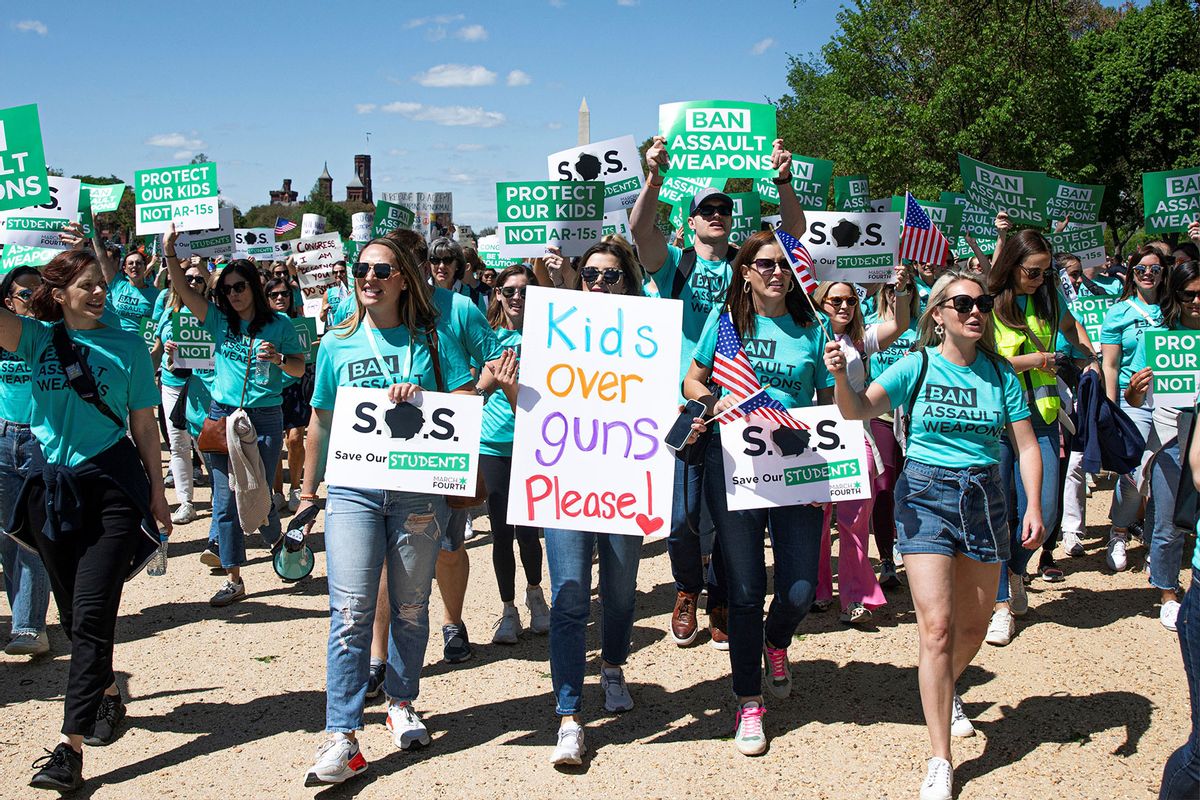When President Joe Biden referred to an "epidemic" of gun violence on the anniversary of the Uvalde shooting, he was not simply using a rhetorical flourish. A recent KFF poll found that one out of five Americans say they have been personally threatened with a gun (the figure is one out of three for Black Americans), while one out of six say they have personally witnessed someone being shot. More than half of American adults say that either they or a family member has had a direct violent encounter with guns, and this is consistent with the documented rise in mass shootings since 2020.
Now a recent study in the journal Annals of Internal Medicine highlights an under-recognized consequence of all this gun violence: The long-term mental trauma inflicted upon the most immediate survivors, those who are actually injured by guns.
By looking at data from 87 adults who had been injured by guns and visited trauma centers in midwestern cities, the researchers found that patients experienced heightened symptoms of post-traumatic stress disorder (PTSD) and depression. In particular, these survivors had a markedly worse quality of life than individuals who had not undergone those experiences. As the authors wrote in the study, "Patients' health-related quality of life" had been poor at the outset, remained poor 6 months after the incidents and had remained "well below scores reported in previous studies of both injury populations and the general population."
"Our study provides evidence that firearm violence survivors report higher PTSD symptoms that remain high 6 months later."
"This study provides a picture of what the mental health experience is for firearm violence survivors early after being injured," Sydney Timmer-Murillo, PhD, a Health & Trauma Psychology Fellow at the Medical College of Wisconsin, told Salon by email. "Our study provides evidence that firearm violence survivors report higher PTSD symptoms that remain high 6 months later. Additionally, their 'health-related quality of life,' or the impact that physical health has on their daily life, is poor after gun violence and continues to be poor."
Want more health and science stories in your inbox? Subscribe to Salon's weekly newsletter The Vulgar Scientist.
"There is little research on mental health after firearm violence, despite the growing number of firearm violence survivors in our country."
This is not to say that the study is perfect, as the authors admit that they had to rely on a small convenience sample of individuals who could easily participate and lacked more thorough data about patients' medical histories. Nevertheless, the authors also feel that their data proves an important point about how America's health care system is under-performing — namely, that it is not assisting survivors of gun violence as they try to move on with their lives in a happy, healthy manner.
"This preliminary study highlights the needs to better understand and manage the mental health consequences of firearm injury," the authors write. "Early screening and comprehensive care may improve outcomes in this at-risk population."
Timmer-Murillo explained there is little research on mental health after firearm violence, despite the growing number of firearm violence survivors in our country.
"Research should look at what increases mental health issues or poor quality of life after firearm violence," she said. "This should also include a focus on the social or community factors that may be influencing recovery such as community violence."
The rash of mass shootings occurring throughout the United States shows no sign of stopping, and experts have performed extensive research on how to not only help survivors, but reduce the violence itself. Studies have consistently found a correlation between specific gun control laws (including mandatory waiting periods and prohibiting firearms to those associated with domestic violence) and reductions in violent crime rates. Similarly, they found that mandatory waiting periods and child-access prevention laws were linked to reductions in suicide rates. By contrast, concealed-carry laws and stand-your-ground laws were both correlated to increases in violent crime rates.
The gun violence epidemic can also be understood in terms of recent events in American history, with a recent paper in the journal Homicide Studies by University of Illinois Springfield political science associate professor Magic Wade finding that the COVID-19 pandemic had worsened existing trends toward gun violence. Describing the event as "fuel on the fire" of the pre-existing gun violence epidemic, Wade told Salon that "fatal and non-fatal firearm injuries both spiked dramatically in 2020, but the broader trend toward more cities experiencing heightened gun violence preceded the pandemic as evidence of this, so on and so on."
In a sense, the new study on trauma and gun violence broadens the larger gun control conversation by moving from how to stop the spike in gun violence to how to provide long-term care for the survivors. As Timmer-Murillo summed it up to Salon, "practically, our study suggests that we need to screen for mental health issues soon after injury. We also need to provide support early that addresses both mental and physical health needs of firearm violence survivors."
CORRECTION: An earlier version of this story incorrectly reported KFF as Kaiser Family Foundation. KFF is not affiliated. The story has been updated.



Shares